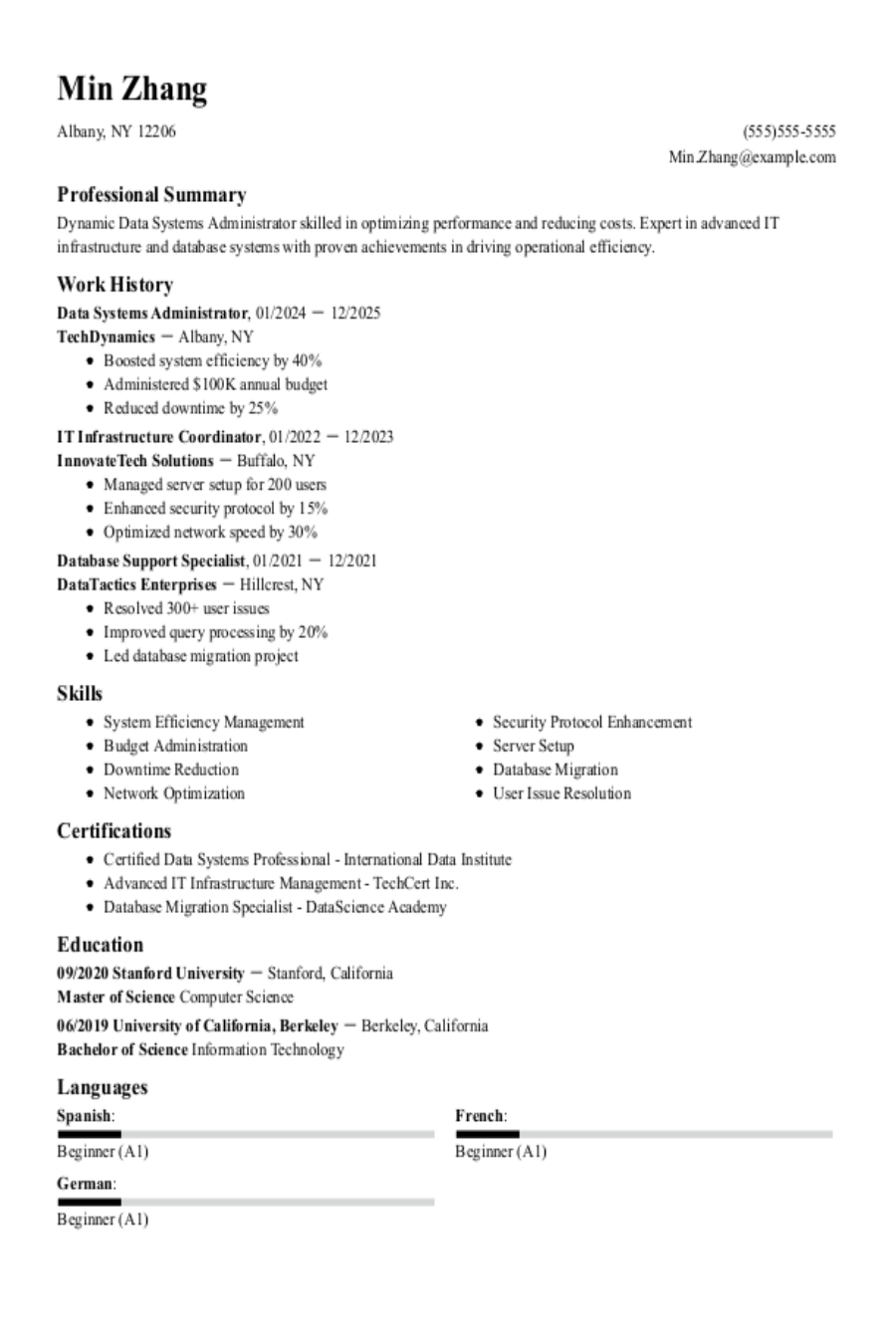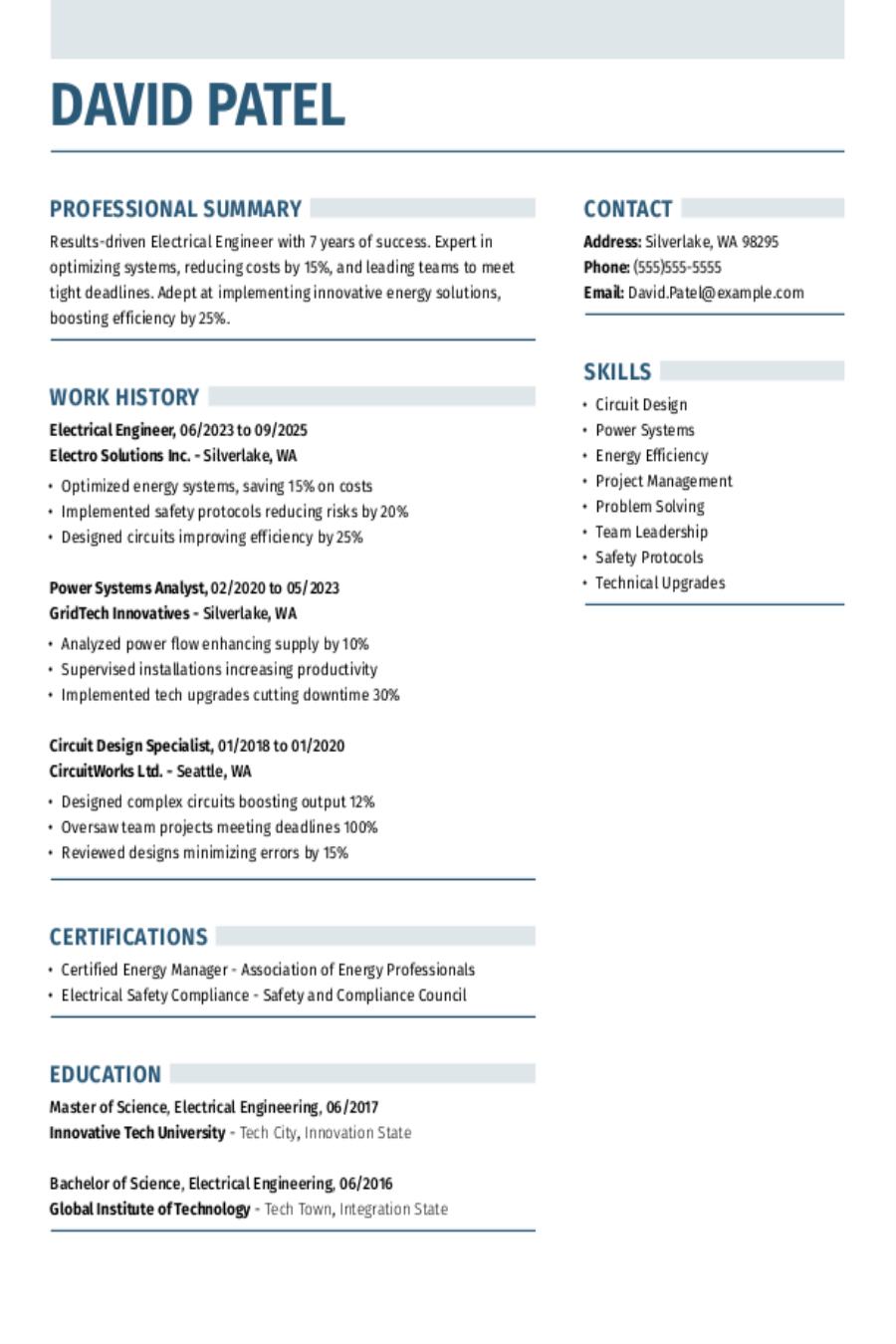Popular Law Resume Examples
Entry-level law resume
An entry-level resume for law should focus on relevant coursework, internships, certifications, and transferable skills like critical thinking and communication to show readiness for a legal career.
Emphasizes soft skills: This applicant effectively demonstrates how soft skills can mitigate limited experience by highlighting significant achievements, such as increasing client satisfaction by 40% and reducing liability risks by 30%, showcasing strong negotiation and advisory capabilities.
Showcases education: This resume builds the candidate’s credibility by placing a strong focus on their educational background, establishing their expertise despite limited experience.
Mid-career law resume
A mid-career law professional's resume should emphasize a strategic mix of relevant experience, skill mastery, and ongoing professional development to effectively catch the attention of prospective employers.
Employs active language: Using action verbs such as "reduced," "drafted," and "managed" emphasizes initiative and measurable success in legal roles, showcasing a proactive approach to achieving results.
Balances skills and experience: This job seeker's resume effectively showcases a mix of technical expertise in corporate law and a clear trajectory of career advancement, reflecting their commitment to professional growth and client success.
Experienced law resume
An experienced law resume should emphasize key achievements and demonstrate a clear path of professional growth in the legal field.
Follows traditional format: The chronological resume format effectively showcases this job seeker's extensive experience. It allows them to present a clear career progression that highlights key achievements and responsibilities across various roles in the legal field.
Embraces modern design: This candidate's modern resume template highlights their skills and presents their qualifications in an organized fashion that positions them as an innovative and forward-thinking candidate.
No experience law resume
A resume for an applicant with no experience should highlight transferable skills, relevant coursework, and any volunteer work to showcase their potential and enthusiasm for the legal profession.
Emphasizes professional skills: Emphasizing skills in legal research and advocacy highlights the job seeker's readiness for a role in law, showcasing their proactive involvement despite limited direct experience.
Uses a simple style: This resume's clean and straightforward design effectively highlights qualifications, presenting relevant legal experience and academic achievements without unnecessary clutter.
More resume examples
Law Resume Template
Looking for a solid foundation? This professional resume template for legal positions is ready for you to personalize and make your own with ease.
Suki Chen
Westbrook, ME 04095
(555)555-5555
Suki.Chen@example.com
Professional Summary
Experienced lawyer with 9 years in top firms, adept at litigation, contract drafting, and corporate compliance. Proven record in achieving legal success and high client satisfaction.
Work History
Lawyer
Pacific Legal Associates - Westbrook, ME
January 2022 - November 2025
- Managed a portfolio of 50+ active cases.
- Achieved a 90% success rate in client litigation.
- Increased client satisfaction by 25%.
Legal Advisor
Western Corporate Counsel - Westbrook, ME
January 2017 - December 2021
- Drafted and reviewed over 200 legal contracts.
- Reduced corporate legal risks by 15%.
- Conducted employee compliance training for 10+ sessions.
Litigation Associate
Golden Gate Law Firm - Portland, ME
January 2014 - December 2016
- Handled 30+ litigation cases from inception to conclusion.
- Increased settlement awards by 20%.
- Mentored 5 junior associates in litigation procedures.
Skills
- Legal Research
- Litigation
- Contract Drafting
- Client Relations
- Case Management
- Corporate Compliance
- Negotiation
- Legal Analysis
Certifications
- Certified Information Privacy Professional (CIPP/US) - International Association of Privacy Professionals (IAPP)
- Mediation Certification - American Arbitration Association
Education
Juris Doctor Law
Stanford Law School Stanford, California
May 2013
Bachelor of Arts Political Science
University of California, Los Angeles Los Angeles, California
June 2010
Languages
- Spanish - Beginner (A1)
- French - Beginner (A1)
- German - Beginner (A1)
Writing Your Law Resume
Now that you have explored these impressive law resume examples, it's time to learn how to write a resume. We'll take you through each section step by step, ensuring you're well-prepared to craft your own standout document.
List your most relevant skills
An effective skills section on your law resume should focus on both legal knowledge and essential soft skills, such as negotiation and analytical thinking. Tailor this section to reflect the specific requirements mentioned in the job listing. Highlighting keywords from the job listing demonstrates your alignment with the role and shows that you understand what the employer is looking for.
Using keywords from the job listing not only aids recruiters in quickly identifying your fit but also improves your chances of passing through applicant tracking systems (ATS). Make sure to integrate these terms naturally into your skills section, as this will create a strong impression for both human readers and technology alike.
Example of skills on a law resume
- Proficient in legal research using platforms like LexisNexis and Westlaw
- Expert in drafting contracts, agreements, and pleadings
- Effective communicator with a collaborative approach
- Careful attention to detail with excellent organizational skills
Highlighting your soft skills on your resume can set you apart from other applicants. Employers deeply value interpersonal abilities since they are challenging to develop, making them a key asset in any professional environment.
Highlight your work history
The work experience section of your law resume should highlight your achievements and demonstrate how you’ve applied your skills in real-world scenarios. By focusing on what you accomplished in each role instead of just listing duties, you can make your application stand out to potential employers.
Each job entry should include key information: your title, the employer's name, and the dates of employment. These details are important for establishing both credibility and a clear professional background.
Example of a law work experience entry
- Lawyer
Smith & Associates Law Firm - New York, NY
June 2019 - Present - Represent clients in court proceedings and negotiations, achieving a favorable outcome in 85% of cases handled
- Conduct legal research and draft complex legal documents including contracts, motions, and briefs, ensuring compliance with local laws and regulations
- Advise clients on legal rights and obligations, simplifying complex legal language to improve understanding and confidence in decisions made
- Collaborate with a team of attorneys to develop case strategies, leading to successful resolutions for high-stakes litigation cases
- Mentor junior associates on effective legal practices and client relations, fostering professional development within the firm
Highlighting outcomes and achievements in your experience section is essential because it demonstrates how you’ve added value in past roles. Employers appreciate concrete examples of success, as they indicate your ability to produce results and tackle challenges effectively. This approach not only differentiates you from other applicants but also shows that you are results-driven and proactive in your work.
Include your education
The education section of your law resume should clearly list your academic credentials in reverse-chronological order, starting with the most recent degree. Include all relevant diplomas and any professional certifications while omitting your high school diploma if you hold a higher qualification.
If you are currently engaged in ongoing education or have not yet completed your degree, be sure to highlight your highest achieved level along with an expected graduation date. It is also beneficial to include bullet points that reflect relevant coursework or notable accomplishments during your studies.
Common certifications for a law resume
- Certified Legal Manager (CLM) – Association of Legal Administrators (ALA)
- Board Certified Specialist in Family Law – North Carolina State Bar
- Certified Information Privacy Professional (CIPP) – International Association of Privacy Professionals (IAPP)
- Certified Compliance & Ethics Professional (CCEP) – Compliance Certification Board (CCB)
Sum up your resume with an introduction
A strong profile section on your resume is important for making a strong first impression. It serves as your personal introduction, providing a snapshot of your qualifications and career trajectory.
For seasoned job seekers, a professional summary is the ideal choice. It allows you to showcase significant accomplishments and relevant skills right at the top of your resume. If your background is limited, include a goals-based resume objective that reflects your dedication to learning and development.
Professional summary example
Dynamic and careful attorney with over 10 years of experience in civil litigation. Demonstrated success in advocating for clients, achieving favorable outcomes through strategic negotiation and thorough case analysis. Proficient in legal writing, trial preparation, and providing insightful legal counsel to improve client understanding and engagement.
Resume objective example
Eager law graduate looking to use strong analytical abilities and exceptional communication skills to improve a progressive legal practice. Committed to supporting case development and client advocacy while fostering professional growth within a collaborative team environment.
As a law applicant, your resume profile should be concise yet packed with essential information. Aim for no more than three sentences that highlight your most critical qualifications and experiences. You can effectively communicate any additional insights in your cover letter.
Add unique sections to set you apart
Incorporating optional resume sections allows you to highlight your distinctive qualifications for law positions. These sections serve as a platform for you to showcase skills and experiences that set you apart from other applicants.
By including relevant hobbies, volunteer work, or certifications, you provide employers with insight into your personal values and professional abilities. This not only reflects your commitment to the legal field but also illustrates how your life experiences contribute to your unique perspective as a applicant. Engaging in community service or participating in legal clinics can significantly improve your appeal by demonstrating dedication and initiative.
Three sections perfect for a law resume
- Languages: In law, effective communication is important. If you can speak additional languages, it improves your ability to connect with clients and colleagues from diverse backgrounds. Include these language skills on your resume to stand out.
- Volunteer Work: Including volunteer work on a resume showcases your commitment to community and helps highlight valuable skills. It reflects your dedication, making you stand out as an applicant who cares about more than just professional success.
- Accomplishments: In law, quantifiable accomplishments are important to demonstrate your impact and credibility. Present these achievements within your work experience section or consider adding a distinct accomplishments section to emphasize them.
5 Resume Formatting Tips
- Choose a format that matches your career stage.
Choosing the right resume format is important for presenting your qualifications effectively. If you have ample experience, a chronological format showcases your career progression well. For those new to the field, consider a functional format that emphasizes your skills. If you have diverse backgrounds, a combination resume can highlight both experience and abilities effectively.
- Pick a smart resume template.
Using a professional resume template is important for making your information stand out. It improves readability and helps hiring managers quickly understand your qualifications. For those who prefer a custom format, it's best to keep it clean and select fonts that are easy to read while ensuring they work well with applicant tracking systems.
- Select an appropriate font.
To improve your resume's readability, opt for a clear, professional font. Fonts like Helvetica, Garamond, or Georgia can make your document appealing and easy to read for both ATS and hiring managers.
- Use consistent formatting.
Ensure your resume features uniform margins and is aligned to the left. This creates a polished look that improves readability and professionalism.
- Keep your resume to one or two pages.
When creating your resume, remember that resumes should be one page long unless you have extensive experience to showcase. Keep the content concise, highlighting only the most relevant information to make a strong impression.
Tools for Your Job Search
Are you ready to advance your career in law? Before submitting your application for that coveted position, make sure to use our ATS Resume Checker. This essential tool provides insights into how well your resume is likely to perform with the automated screening systems that many law firms implement.
Looking to improve your application further? Our AI Resume Builder offers tailored recommendations specifically designed for legal professionals, along with a selection of polished templates that effectively showcase your skills and achievements.
Frequently Asked Questions
Last Updated: November 25, 2025
Certainly! A cover letter is important because it adds depth to your resume and creates a bridge for communication with employers. It’s where you can express why the role in law excites you and demonstrate how your unique experience makes you an ideal job seeker. Take this opportunity to write a cover letter that complements your application.
Make the process seamless with our AI Cover Letter Generator, designed to help you quickly craft a tailored cover letter. You can choose from a variety of cover letter template options that align perfectly with your resume, ensuring a cohesive and professional presentation.
A resume is typically concise, spanning just one to two pages, whereas a CV (curriculum vitae) can extend several pages and includes in-depth information about your academic background, research contributions, publications, and professional experiences. This comprehensive detail makes CVs ideal for showcasing your qualifications.
You should use a CV when applying for positions in academia or specialized fields such as law. If you need assistance crafting a tailored CV quickly, our online CV Maker is an excellent resource. You can choose from various CV templates designed for different industries and career levels to create a standout document in minutes.
A lawyer's resume is ideally one page. However, when you have extensive experience or notable achievements, a two-page resume may be appropriate to fully showcase your qualifications and background.
Absolutely, essential skills like "legal writing" and "negotiation" are important for law resumes. It’s also beneficial to check job descriptions for specific keywords that employers prioritize to improve your application.
To build a strong skills section for law, integrate your technical expertise—like legal research and case management software—with essential soft skills such as communication and analytical thinking. In your experience section, illustrate how these skills contributed to successful case outcomes or streamlined processes, showcasing your effectiveness in the legal field.
To improve your law resume, focus on tailoring its content to highlight the essential skills for the position you're applying for. Review the job description carefully and extract keywords that reflect your qualifications. Incorporate these terms into your resume to showcase your fit for the role effectively.
Was this information helpful? Let us know!
Keith is a Certified Professional Resume Writer (CPRW) and trusted media source in the career industry with over a decade of experience helping job seekers stand out.
More resources

Only 1 in 10 Resumes Include Measurable Results, New Analysis of 18.4M U.S. Resumes Finds
Resume Now takes a closer look at measurable results on resume...

Top Entry‑Level Careers That Are Fast‑Growing, Higher‑Paying, and AI‑Resistant
Artificial intelligence is touching more parts of work every y...

What Does It Mean if an Interviewer Says "Good Luck" or "We'll Be In Touch"?
Read on to learn the meaning behind these standard post-interv...

Interview-Winning Data and Systems Administration Resume Examples and Tips
Was this information helpful? Let us know ...



